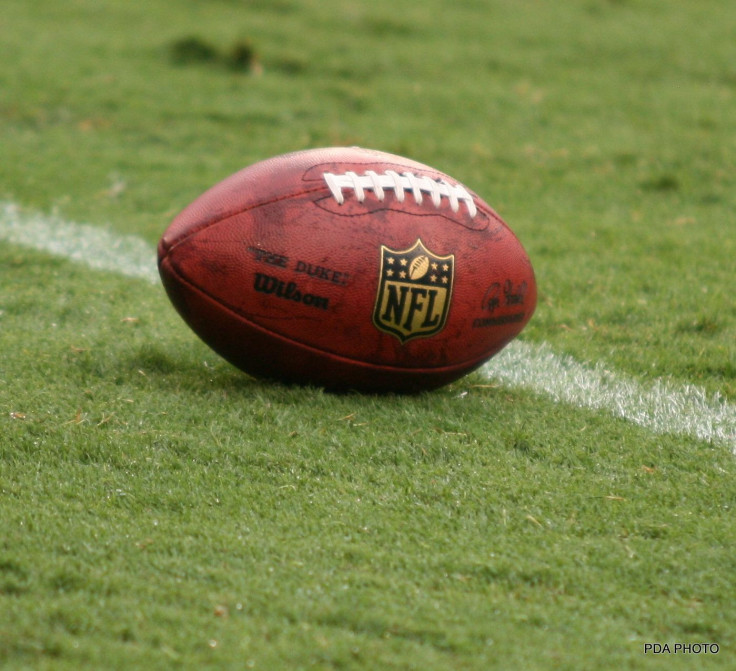Rose-Colored Glasses In The NFL: Fans And Sports Reporters Overestimate How Good Their Teams Actually Are

With the NFL season about to kick off this Sunday, it’s worth reminding any prospective fans out there of one simple thing: You’re probably overestimating how good your favorite teams actually are; and likewise underestimating your most hated team’s chances at success. That’s the conclusion made by a deceptively simple but revealing study published in PLOS-One Wednesday.
Enlisting more than 1,000 participants through Amazon’s Mechanical Turk, “a paid online crowdsourcing platform,” the authors asked them to estimate the number of games of their most-liked and least-liked teams would win this upcoming 2015 season (the study took place in April).
While there might be good or bad teams during any one season, once you add up all the wins and losses over 256 games played by 32 NFL teams in a regular season, the average win-loss total across all teams will always be eight to eight.
“When two teams play, only one team can go home victorious. Therefore, if fans forecast more wins than average across teams, they are collectively biased,” the authors explained.
And sure enough, that’s exactly what happened, with the participants on average estimating 9 and a half wins for their favorite team, and just slightly over 6 wins for their least liked team. More astoundingly, for those participants who passed a preliminary quiz about a simple NFL rule — thus confirming their actual fandom — the optimism bias was even greater, at over 10 wins per favored team (nearly 90 percent of the subjects passed said quiz).
Referencing a 2014 informal survey taken of ESPN NFL reporters who were asked to estimate the success of the team they had been assigned to cover, the authors found a similar, if slightly weaker, overestimation of their predictive ability. Damningly, the experts’ forecasts proved to be “no better correlated with the observed wins than a naive forecasting model that predicted that each team would duplicate its 2013 win total in 2014.”
Even though these beat reporters weren’t necessarily fans of the team, the authors theorize that their bias came from their need to diligently and constantly follow the team’s happenings, subtly becoming attuned to noticing their improvements while ignoring their flaws or the accomplishments of other teams. In other words, fan or sports reporter, the more invested we become in a team, the greater our rose-colored glasses.
Among other interesting tidbits was the finding that the New England Patriots and Dallas Cowboys proved to be the teams that were both the most liked and disliked, and that big-market, nationally talked-about teams were the least likely to have an large “optimism gap,” when compared to smaller-market teams. These teams were more accurately judged by both fans and haters, whereas the authors believe that the lack of national focus on the smaller teams allows fans and reporters to come up with their own, more biased, opinions about their chances at success — as one example, fans of the Cincinnati Bengals on average estimated about six more wins than did their detractors.
As to why we overestimate our team’s chances? “Optimism bias may be so prevalent because it is associated with improved health outcomes and workplace performance, whereas realistic expectations are associated with depression,” the authors explained. “On the other hand, optimism bias can have negative consequences, such as not seeking needed medical care because of underestimated risk.”
It isn’t all just bias though, since the very nature of pro sports allows fans to feel more confident about their teams. Teams that performed poorly the past season are likely to at least somewhat improve the following year, while the best teams will probably lose a few more games but still remain successful.
Still, the researchers are hopeful their findings can teach fans a little bit of hubris.
"Optimism bias is a well-documented phenomenon, but is difficult to measure in the real-world as there are so many factors to consider," said study author Dr. Olivia Guest, from Oxford University's Experimental Psychology department, in a statement. Sports fans who bet on games should be aware of the optimism bias before putting money on their team's victory, as their expectations may not match the reality."
Source: Love, B, Kopeć L, Guest O. Optimism Bias in Fans and Sports Reporters. PLOS-One. 2015
Published by Medicaldaily.com



























